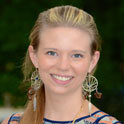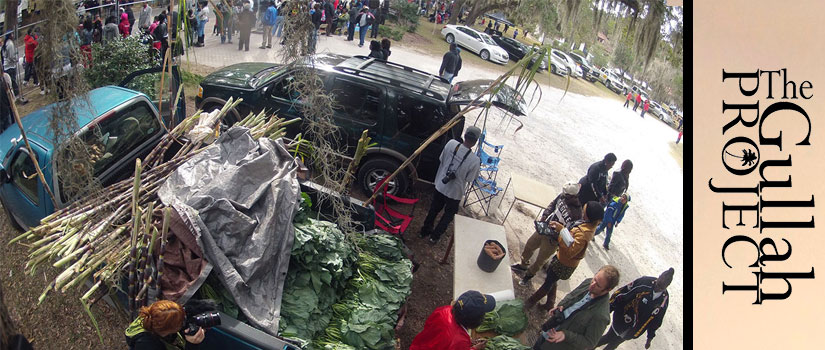Posted Jan. 8, 2015
By Haley Hinze, first year M.M.C. student
Where you find the story might also be where you find the classroom.
Press play.
A woman's voice begins to sing, strong and clear. A rainbow stretches across the
horizon as a light breeze from the passing storm moves the grasses that hug the harbor's
banks. A man searches the shoreline for oysters at sunrise, plucking them from the
rocks. Dewdrops collect on the tomato seedlings growing in a small field. A fire
burns bright as the Gullah people gather for a nighttime meal on St. Helena Island,
South Carolina. The first 30 seconds of this film illustrate just some of the dying
culture right here on the Southeast coast.
"I love telling people visual stories," said Denise McGill. An assistant professor
in the School of Journalism and Mass Communications, she has had many opportunities
to do so. She traveled to 25 countries in three years as an overseas correspondent,
wrote and photographed articles on faith, migration and cultural issues, and completed
many freelance assignments.
In 2011 she was introduced to St. Helena Island and the Gullah people. "I worked
for several years collaborating with soil scientists. We put our brains together
and did several videos about conservation issues. One of the films we did happened
to be about the conservation and farming practices on [St. Helena Island]," she said.
After the funding for that project ended, McGill continued to work on the island to
create The Gullah Project
It eventually became the biggest project McGill has ever worked on, she said. She
is working with a team, mostly students, who work as editors, photographers, production
assistant, writers, graphic designers, web designers and social media marketers. Together
they are creating a multimedia website and documentary film about the farming and
fishing practices of the Gullah residents of St. Helena Island. TheGullahProject.org includes photos, interviews with some of the island's inhabitants, blogs and behind-the-scenes
footage. The documentary, set for release summer 2015, highlights the culture that
is on the verge of disappearing in South Carolina.
Through the past four years, McGill has found many unique adventures on this small
coastal island. The Gullah people have welcomed her into their "friendly, but private"
lives. She is able to show the world an "important piece of our heritage" that many
don't even know exists.
McGill also gets some of her students involved in the project. Among her undergraduate
classes, she looks for students that demonstrate high work ethic and quality of their
craft. Most participants of the project are volunteers, but she can hire a few of
them. They become part of the team — marketing, building the website, transcribing
interviews and even going on assignments to St. Helena Island.
Senior visual communications student Michael Tolbert manages the social media and
promotion for the project, and has gained new perspective on his career from his work
with McGill. "I've traveled a lot over the years. I had been down to Hunting Island
. . . and went through St. Helena Island all the time. I had never even stopped to
notice this culture. When I joined the team and went down there I was blown away."
The Gullah Project has given Tolbert experiences that he would not have gotten in
the classroom alone. He had never thought that mass communications and agriculture
could combine in the way that they have with The Gullah Project. Now, he is able
to keep an open mind to what different industries have to offer to journalists. McGill's
goal is to show the students she brings on the team not only what goes into a multimedia
project, but that working beyond classroom assignments can benefit them immensely.
McGill advocates for looking around for stories and project opportunities, whether
they are on another continent or right here in South Carolina. The Gullah Project
combines media with state history, fishing, conservation issues and more. "I had
a great career as an overseas correspondent . . . but there is great stuff under your
nose," she said. She enjoys encouraging her students to find those things.
"The more you know about the world, the more you know about journalism," McGill said.
Sometimes the best way to learn is to get outside the classroom and into the world
where the stories happen. Sometimes these stories can be right in your own backyard.
Like McGill and Tolbert, one seemingly small job on a tiny island can lead to enormous
things. No matter what you find, where you find it matters.

Haley Hinze
Haley Hinze is a first-year Master of Mass Communication student from Greenville,
S.C. With interests in both written and visual communications, she aspires to enter
the magazine publishing industry. When she's not in school, you can find her traveling
almost anywhere in the country.

